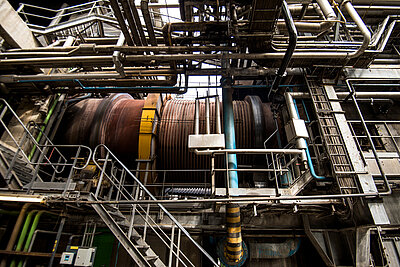Processing at very high temperature breaks down PFAS
Waste materials with high PFAS concentrations are incinerated at a high temperature inside Indaver’s rotary kilns. This ensures the irreversible destruction of PFAS compounds in the waste.
PFAS is a generic term for fluoro-organic compounds. PFOS is one of these compounds.
The European Regulation on POPs (persistent organic pollutants) requires these persistent organic substances to be destroyed or irreversibly transformed by thermal treatment.
High-temperature waste incineration is therefore a suitable and mandatory method for treating waste containing high concentrations of highly persistent organic substances such as pesticides, herbicides, PCBs, dioxins and, therefore, PFAS compounds.
The Best Available Techniques Reference Document (BREF) for Waste Incineration describes how thermal treatment technology should be applied.
Waste substances with high concentrations of persistent organic substances are broken down at high temperatures in a rotary kiln. The rotary kilns are equipped with a very extensive gas cleaning system. The treatment process is closely monitored and adjusted where necessary.
In the flue gas purification system, the remaining fluorides are captured by dosing additives and activated carbon. The process is closely monitored. Indaver also ensures the safe and sustainable treatment of residual products from the processing. The residue is further treated and disposed of at a landfill site for hazardous waste. This landfill site is lined with several water-impermeable layers to prevent any long-term impact on the environment.
Some specific waste products with low PFAS concentrations can also be technically processed in grate incinerators and fluidised bed facilities. Here too, thermal treatment ensures maximum and irreversible destruction of PFAS compounds. These installations also feature an extensive flue gas cleaning system.
Indaver thus plays an important social role by irreversibly destroying these waste streams.
Process in line with environmental permit
The treatment process is carried out according to the standards and conditions laid down in the environmental permit.
Wastewater from the Indaver site in Antwerp is treated in a water purification plant before being discharged. The licensed discharge conditions have been tightened up in recent years.
The quest for continuous improvement
Indaver has always played its part as an essential link in sustainable waste management. We follow new developments closely and make the necessary investments to continually improve our processes. We are now also cooperating fully with the authorities to further develop the legal framework and standards for the future, based on scientific insights. In this way, we are helping to ensure a clean future.
